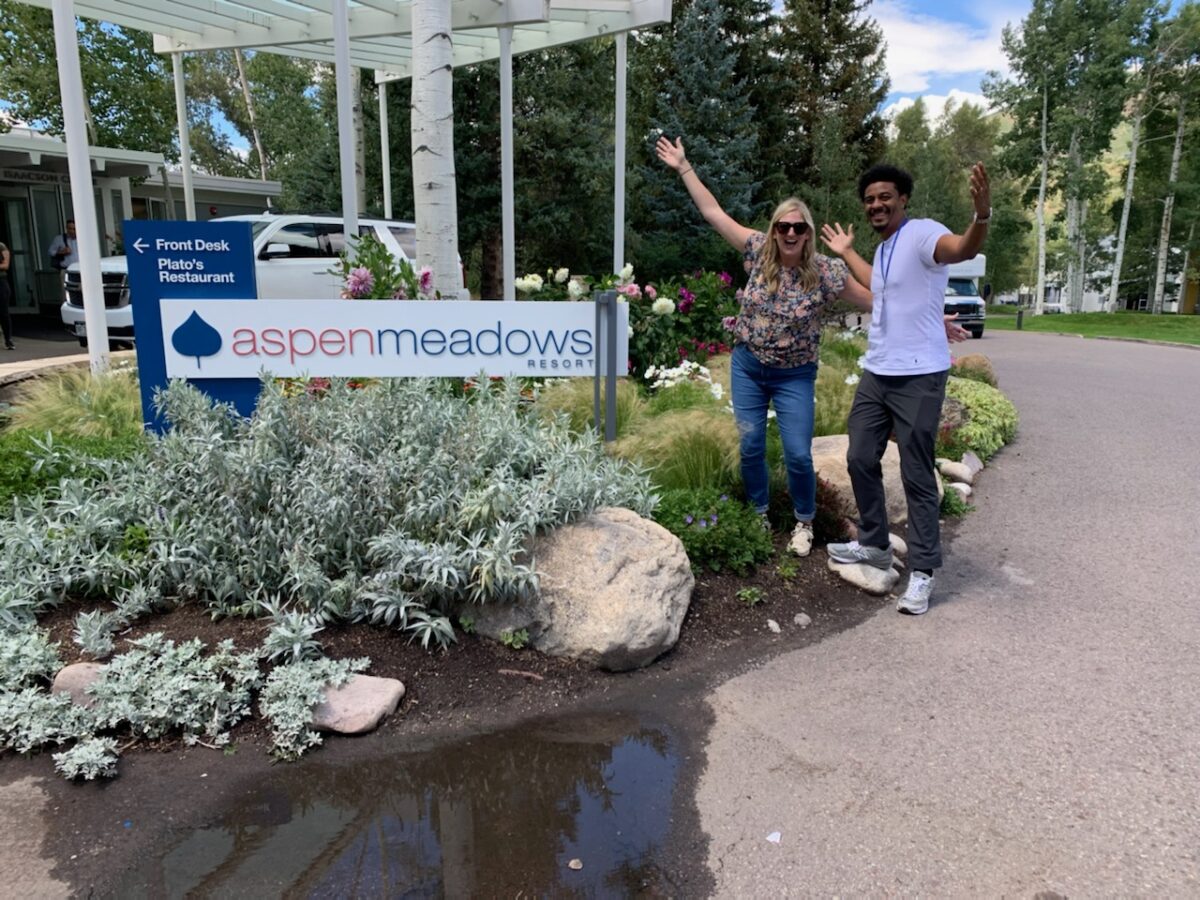
The following is part of my monthly column, One Day and One Goal: Expanding opportunity in N.C. I invite you to follow along as I share stories from classrooms and explore critical issues facing education in our state. Go here for past columns.
My journey into education leadership was unconventional. My experience and background uniquely prepared me to lead in this space, however, because there are integral tenets of leadership and management that translate across industry. They are often the skills that make or break the connections that build momentum toward achieving a shared goal.
When I was leading discussions with the Aspen Institute about a potential partnership with Teach For America North Carolina, most of my team had never heard of Aspen’s Executive Seminar in the context of professional development for educators. Technically speaking, it isn’t.
It is, however, highly regarded professional development for leaders, because it is an invitation for participants to examine their own leadership in the context of their core values. That is why this partnership was a strategic step forward for our region.
What brought me to the K-12 sector was Teach For America’s vision for developing leadership skills that make an impact, whether you’re a teacher, a school or systems leader, a policymaker, or a nonprofit leader. What I brought to the table was a perspective outside of this sector and pathways for industry leaders to sit at new and different tables.
Seeing from a 8,000-foot perspective
I first learned about the Aspen Institute ten years ago, when I applied for their Rising Presidents Fellowship at the urging of a peer from my doctoral program. I was one of the first leaders among South Carolina’s community college professionals to be selected for the College Excellence Program in 2018, and I now sit on their Alumni Advisory Council, seeing firsthand the myriad ways the institute works to expand leadership opportunities for students and professionals in our country. However, Mebane Rash, CEO of EducationNC, introduced me to this other arm of their executive-level development a year ago, further fueling my belief that TFA North Carolina’s broad and diverse alumni network should have access to the same caliber of leadership development.
Last summer, TFA North Carolina and the Aspen Institute officially announced a joint scholarship program for such a purpose. Since then, twelve TFA alumni have attended the Executive Seminar on Leadership, Values, and the Good Society, where, along with reading, reflection, and sustained dialogue, participants also practiced care of their bodies, enjoying nutritious meals and hikes through the natural beauty of the Aspen Meadows campus in the Rocky Mountains of Colorado.
The stunning destination was certainly a draw for the TFA NC alumni scholars, but they soon realized it was no vacation. Instead, they encountered a rigorous and immersive dialogue with the purpose of achieving meaningful leadership growth through the critical examination of personal core values.
The art of dialogue
Juan Lascano of Profound Gentlemen attended the seminar in August and summarized the experience as “a check for my executive compass.”
“I had the opportunity to reflect on my leadership style and challenge myself. Where do my values fall? Where do my mindset and abilities and style come in as a leader?”
Alyssa Sharpe of Digi-Bridge attended alongside Lascano and echoed his sentiment. “As a CEO, I’m the person at the top. It’s hard to be challenged, because the stakes are so high. But at Aspen, everyone there is an equal. We could have nonpartisan civil discourse and have real conversations without labels.”
Vichi Jagannathan, co-founder of the Rural Opportunity Institute, valued the environment of a small group forum intentionally composed of executives across agencies and associations — from military and government officials to corporate and nonprofit CEOs.
“Oftentimes, I am around a lot of other people who think like me or have had the same experiences as me, and that can sometimes feel like an echo chamber,” said Jagannathan, going on to explain the benefit of practicing dialogue across differences, including race, economic background, and political ideology. “It made me really think. If we ultimately want to create this long-lasting systemic change for kids in eastern North Carolina, we have to understand and interact with folks in all these different positions.”
All three agreed that the opportunity to exercise the muscle of making meaning and engaging in challenging conversations was a significant element of their experience, and that their organizations’ respective missions would benefit from their ability to foster connections across vast and deeply-set differences.
“You will definitely disagree with people in the room, and the question is, how do you navigate that to arrive at some sort of shared alignment?” said Jagannathan. ”Is it possible to maintain dialogue even when there’s no way we can find common ground?”
Bringing leaders out of isolation
Another significant skill participants developed was reflection, which, when done errantly or only occasionally, only deepens the isolation leaders can feel in their roles. TFA NC alumna and staff member Leaundra Clay spoke to the new depths of reflection she engaged in while attending the seminar in June.
“We often stop at how we think or feel. We don’t think about reflection as a process leading to change,” said Clay. “I was pushed to reflect with others via dialogue, rather than in siloed silence.”
Sharpe seconded the practice of reflection that she felt she could immediately implement upon completing the seminar. “I’m making decisions all the time as a leader. When I’m not allowing time to reflect, I’m thinking about what’s next, where are our numbers, what went well or didn’t. It’s rarely based on values.”
Reflection as a sustaining, community-building experience can deepen connections within coalitions. Within the environment of the seminar, reflection can also expand attendees’ networks, relieving the pressure of demanding leadership responsibilities through dialogue and shared experiences.
Inviting TFA NC alumni to partake in our new Aspen Institute scholarship is just one part of our commitment to thinking expansively about the future of education. In addition to continuing to offer the opportunity to attend the executive seminar due to the generosity of private donors that underwrite attendance exclusively for TFA NC alumni, our organization is also offering skill-based leadership development through the Center for Creative Leadership for alumni at any point in their career journeys.
We believe that, in addition to supporting the daily efforts of our teachers, we must empower leaders in this industry with access to diverse networks and values-based development. In doing so, we hope to not only challenge their thinking but also sustain their efforts to expand opportunities for all students.
We know that we are on the right track after hearing Jagannathan‘s reflection. “In order to really push the bounds of the work we’re doing and get to brand new solutions that might serve our kids and families differently,” she shared, “we will benefit from hearing a broad range of perspectives.”


